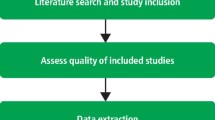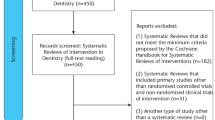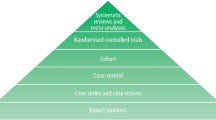Abstract
Data sources Sources of reviews were the Database of Reviews of Effectiveness (DARE) and completed systematic reviews registered by the Cochrane Oral Health Group in the Cochrane Library.
Study selection All systematic reviews that examined the effectiveness of interventions for oral, dental and craniofacial disorders and diseases were eligible for inclusion.
Data extraction and synthesis A quality assessment checklist was completed for each study.
Results A total of 115 studies were identified, of which 65 were relevant to the review. The area most frequently evaluated within the reviews was pain relief or prevention (20 out of 65, ie, 31%) followed by caries, and oral medicine. The quality assessment of the systematic reviews identified highlighted key areas where improvements could be made. One major weakness was that the search strategies employed in reviews were not always adequate: only 12 reviews (19%) demonstrated an attempt to identify all relevant studies. Other areas of weakness include the screening and quality assessment of primary studies, the pooling of data and examination of heterogeneity, and the interpretation of findings.
Conclusions The quality of systematic reviews in dentistry could be improved. If future clinical decisions are to be based upon systematic reviews, it is imperative that reviews address clinically-relevant, focused questions, and follow a transparent, well-designed protocol.
Similar content being viewed by others
Commentary
This review of the quality of systematic reviews was conducted by four members of the Cochrane Oral Health Group. The study does not claim to be a systematic review of systematic reviews in dentistry but it has been carried out in the manner of a high-quality review. One of its main findings is that only 19% of the systematic reviews in dentistry attempted to identify all the relevant studies; ironically, this is a charge that could be made against this one were it a systematic review. Other areas are also identified of which dental researchers need to take note, if the quality of dental systematic reviews is to be improved.
Within the limits of the study the authors did observe an encouraging trend — an increase in the number of systematic reviews published in the field of dentistry. It will also be interesting to note whether there is an increase in the quality of these reviews over the next 5 years. The work of the Cochrane Oral Health Group, and the clear guidelines for systematic review in the readily-available QUOROM1 and MOOSE2 statements, should help. I would recommend anyone thinking of conducting a review to look at those guidelines as well as this paper: all provide much useful information.
Practice point
Although the increase in availability of systematic reviews in dentistry is welcome, care needs to be taken to ensure that these reviews are well-conducted and clinically relevant.
References
Moher D, Cook D, Eastwood S, Olkin I, Rennie D, Stroup D . Improving the quality of reports of meta-analyses of randomised controlled trials: the QUOROM statement. Lancet 1999; 354:1896–1899.
Stroup D, Berlin J, Morton S, et al Meta-analysis of observational studies in epidemiologyA proposal for reporting. J Am Med Assoc 2000; 283:2008–2012.
Author information
Authors and Affiliations
Additional information
Address for correspondence: A-M Glenny, Lecturer in Evidence Based Oral Health Care, Cochrane Oral Health Group, MANDEC, University Dental Hospital of Manchester, Higher Cambridge Street, Manchester M15 6FH, UK. E-mail: a.glenny@man.ac.uk.
Glenny A-M, Esposito M, Coulthard P, Worthington HV. The assessment of systematic reviews in dentistry. Eur J Oral Sci 2003; 111:85–92
Rights and permissions
About this article
Cite this article
Richards, D. The quality of systematic reviews in dentistry. Evid Based Dent 5, 17 (2004). https://doi.org/10.1038/sj.ebd.6400242
Published:
Issue Date:
DOI: https://doi.org/10.1038/sj.ebd.6400242



